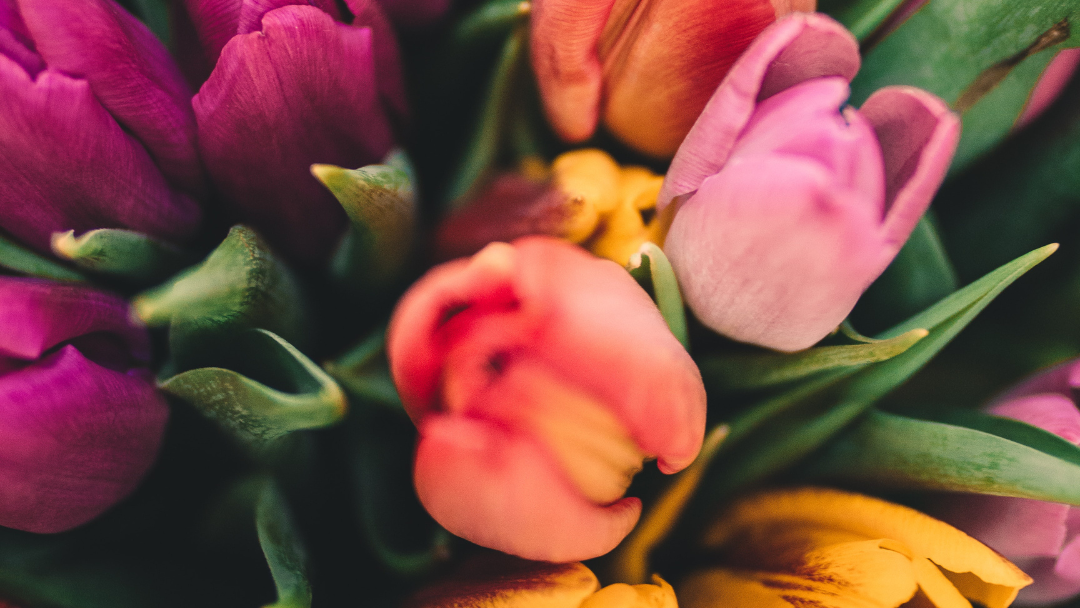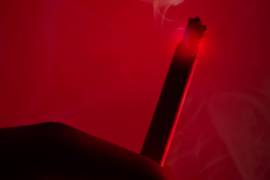THE DAY MY FIANCÉE, BLOSSOM, WALKED OUT ON ME, the potted plant that adorned our kitchen began to bloom. Great, trumpet-shaped flowers—purple, pink, peach, and white—drooped like lazy, cumbersome skin tags. They hung in the air, suspended, like mournful tears static at the corners of heartbroken eyes. For years, the unremarkable plant sat near the window, unchanged and largely unnoticed. In the half-decade it graced our kitchen, stationary and mute while overseeing countless cups of coffee brewed, a thousand meals or more cooked—many of them the same four or five—the inconspicuous plant did not command my full attention once. In all honesty, I don’t think it had grown a single inch.
Yet since the day Blossom stood up, mid-meal with a mouth full of mushroom risotto, one of my standards on the nights it was my turn to cook, and shouted out over whatever Netflix show we had agreed upon after almost an hour of flicking through the same, over-familiar content, declaring like some Greek orator to an assemblage of toga-clad masses, “Let it be known, you and I end as of now!” Since that day—since that very moment—the potted plant in the kitchen responded with tremendous growth, almost as if in acknowledgment to a cataclysmic event, as if seizing the opportunity to assume a vacant role, fill up a gaping, bottomless pit.
Before I could even pause the program, the happy-go-lucky presenter introducing the bikini-clad beauties and six-pack studs that would live and fuck together in a Spanish villa for the next six weeks, Blossom was out the door, down the road in our shared Civic. When I crossed the room to call out into the night for my fiancée to come back, I noticed it for the first time—a single bud about to burst at the seams, a floriferous tumor on a plant that suddenly seemed a little bit bigger.
Naturally, I wasn’t all that interested in the plant, even after a second bud formed from nothing, popped into existence like a time-lapse video along its slithering, outward vine. Even then, I wasn’t all that focused on its strange and sudden burst of growth, having just heard Blossom tell me that she and I are done, having just witnessed my fiancée walk out the door, watching the crimson glare of the ass-end of a Civic dwindling into the lonesome night. I was preoccupied with my shattered heart, the downward, domino effect of my emotional state. The plant could have sprouted legs, licked its chops, and sang out “Feed me, Seymour,”and still, I probably wouldn’t have batted an eyelash, wrangled up the energy to correct the vegetation sprawling up and outward from its now undersized pot, letting it know my name is not Seymour, but Jake.
Though I have to admit, when I cried for a time in the corner and eventually stopped, cleared my eyes and looked up to see several more flowers weighing down a branch that was suddenly several inches longer than it had been before I had begin wailing, I did sort of stop and wonder, probably would have gawked and stammered, told someone about the miracle in my kitchen, if—if—there had been anyone present to tell, which there wasn’t—not any longer. So I texted Blossom instead. I told her that I loved her. I told her that I need her. I told her that I’d change, do anything, let her take the reins on the whole Netflix pick-a-show thing. When she didn’t answer any of my texts, I then told her about the plant, how it was growing like an absolute motherfucker.
In the end, I went to bed, didn’t even free the mid-bounce bosoms that were locked in a pause, fake jobs frozen and bursting at the seams on my big screen, bound in a too-tight bikini with a plant pattern and bright, floral motif. I didn’t even kill the screen, just let those unambiguous breasts hang there, stationary and gleaming, bathing the room in an amber, Spanish sunset and aquamarine pool water, illuminating a moving plant as it turned—I shit you not—to look at the screen, which I then unpaused for the benefit of my new, botanical roommate.
That night I dreamed of Blossom running away. I dreamed of her rose and lavender scent, the waft of her shampoo, the aroma of garden flowers dissipating in the wake of a Civic’s fading, cherry-red brake lights. I dreamed of my fiancée shriveling up, withering away like detached, dried-out orchid petals. I dreamed of her falling to pieces, her atoms like smithereens swept up in the wind, dandelion seeds adrift on a summer breeze, a swirl of confetti, of potpourri upended from a rusty bucket to spiral in a black, foreboding funnel, a tornado or the wrath of God. I dreamed of Blossom running away. Then I woke to blossoms crawling closer, inch by inch.
From the other room, I heard the sound of the television—music and voices, David Attenborough and birdsong. Blossom! I thought, and kicked off the sheets, my morning wood like a rigid, pointed finger guiding me to the return of my woman. But no. There was no one there. No one but the potted plant, thirty or fifty bell-shaped flowers, all colors of the rainbow, extending like a long chain of Tibetan prayer flags, like church bells, wedding bells, a mockery of a union in marriage no longer to be.
There he was on the screen: Sir Attenborough, 90-something and still going strong, still educating the world about how precious our planet is, how doomed it is because of us all. Across the couch a green-leafed tendril spread, sprawling over the cushions to twine around the lampshade, curling downward to snake its way onto the coffee table. Bedecked with flowers, its spiraling grasp coiled over the television remote, tinkling little cloudbursts of pollen while perusing an over-familiar library of shows, mindless, reality TV and Hollywood heartthrobs dressed like comic book characters, sitcoms and documentaries.
The pot-bound couch-potato set down the remote when David started giving an animated, passionate discourse on the complex relationship between plants and insects. I sat down and did my best not to flinch when an elongated vine crept over to settle upon my thigh. I reached out and held a waxen leaf in the delicate pinch of my thumb and forefinger, listened to the nature program about plants, to the hypnotic, geriatric poetry of Sir David Attenborough, and found a measure of peace in the moment, learned a lot about plants.
Days later, I waded into the kitchen. I forded the green river of leaf and vine that spiderwebbed, knee-deep, to hide the wooden floorboards that supported my weight. I struggled against the verdant biomass, the great swathe of vegetative cat’s cradle, the suspended, botanical cable supporting a gondola of vibrant flowers, a taut string of colorful Japanese lanterns reflecting what little light penetrated the emerald canopy and thick, peridot undergrowth of my home. With difficulty, I found the fridge. An upper-body workout later and I had opened it up, pried the door outward so I could feed myself, will myself to keep going even though I was drowning in sorrow, sinking into the depths of grief, missing my fiancée, pining for Blossom.
Then I heard the bell of the cat’s collar, a muted jingle of tinny music from the foyer. I spent some time adventuring across my home, swimming in a green sea choked and knotted in kelp, breast-stroking down the hallway, wielding a steak knife—a makeshift machete—and hewing away what path I could manage in the dense, Borneo jungle that had become my dwelling. In the paltry light coming through the opened cat door, a soft glow of outside sunshine was eaten up by layers of leaf and crisscrossing branches. I saw my cat, Princess, bound by the untamed extensions of the potted plant. Like a fly in a web, a princess locked in a tower, she meowed, helpless, a little lion swallowed alive by its vast, jungle home.
I was drenched in sweat by the time I freed my pet cat. I labored for half an hour, straining against the invading verdure within my home. In the end, I had to use the steak knife to cut through Princess’s collar, tear it free from her neck to allow her to breathe, pulling away the many fibrous tendrils that had found their way under the fabric that ringed her fragile neck and knotted within her fur. Then, as if sentient, as if an act of premeditated agenda, the potted plant’s many tentacles slackened, opened up to receive me, perhaps swallow me whole, as I walked back into the belly of my house, sat upon the couch, sans fiancée, and ignited the big screen with those well-known options to entertain; superheros dressed to save the world and young, obnoxious, beautiful singletons hardly dressed, ready to fuck.
The next day, I woke to a room filled corner to corner with edamame, angel-hair spaghetti. Angel hair? More like Medusa’s serpentine locks, a Gorgon with a real bad hair day. Everything was knotted, tangled, and green. At my bedside, hardly detectable, a framed picture of Blossom and I kissing had been cracked, penetrated by stubborn, invading roots. The fissured glass split the image in two, a jagged lightning bolt between our kissing lips. On one side, devoured, smothered and blotted clean from this world, the image of Blossom was lost to plant growth, a great, green shroud to entomb her lost beauty. My own face, adjacent and lip-puckered, was left unmolested, appearing in this vandalized rendition to be kissing the plant itself, the swarm of botanical appendages that throttled my erstwhile fiancée.
When I got up to dress, an outfit awaited me, accosted me with overt suggestion. It hung in midair as if suspended by a coat-hanger, supported and framed by a scaffolding of woody stems. Crisp and well presented, a loud Hawaiian T-shirt stared me in the face, the same one Blossom had jokingly gifted me years ago during our romantic getaway to Maui, the same one I had never bothered to wear again after leaving it on as we made passionate love on a balcony bathed in a blood-orange sun setting over the endless expanse of the deep, blue Pacific. I slipped into its loose-fitting sleeves, gazed down at the floral pattern; broad, green leaves and bright colors upon my chest. I shook my head, but didn’t swim against the current. I buttoned up the shirt and blended right in with the jungle.
Then I weaved and ducked and dove into the living room, traversed with difficulty to the kitchen, and spent the better half of the morning trying to brown some bread and fry some eggs. The stovetop was fickle, going too hot or not going at all; varicose roots embedding, invading the circuitry. The toaster smoked, smelled-up the kitchen with burning vegetation, scorched leaves and vines entwined upon the scarlet grill. Meanwhile, my elbows kept getting caught up in all the occupied space, the latticework of endless overlapping plant-life. Outside the window, through a square-inch of uncovered pane, I saw Princess, collarless, looking in with an expectant, hungry eye, not daring to come in for her kibble, aware of the threat that awaited just inside the cat door.
All at once, I became panicked, eerily aware myself, that I had become prisoner within my own home, to my own potted plant. The docile, unassuming shrub that had been a living paperweight for years, an inanimate, inert object while Blossom and I had lived and loved each other within these same walls, had in her absence, her sudden abandonment, extended so much, so fast, that I hardly took notice to my plight, my lush and cultivated incarceration, my potential death if I do not act soon, escape the steroid expansion of a garden center purchase gone haywire.
I tried to text Blossom, tell her that I needed help from an outside source. To no avail, I tried to find my phone in all that fucking vegetation, that unruly nest of the Jolly Green Giant’s pubic disaster. Next time I have canned corn I’ll give the big lug a 101 on manscaping. In vain, I crawled on my belly across the floor, I scurried like a crab, I limboed like Spider-Man, like Toby Maguire, like Andrew Garfield, like Tom Holland, like all the Hollywood Peter-Parker-by-day, web-slinger-by-night actors that have traded the role, just one more Marvel action man, trying to locate my phone, hoping to send Blossom one last message, tell her one last time that I love her, that I’d take her back in a heartbeat if only she’d find it in her own heart to consider the same for me.
I never did find my phone. But hours later, with a marathon of effort and strain, I did find my bed. Plant tendrils slithered over the edge of the mattress to coil at the corners of the bed sheets, pulling them upward, tucking me in, reaching over and turning out the light, leaving me in darkness and the relative quiet of an empty home but for one overbearing houseplant. Crying myself to sleep, I silently vowed that I’d end it all come the morning. I’d take care of my problem, the all-consuming, unearthly plant invasion that has hijacked my life, stolen my existence, taken root to unhinge my sanity, sprouted to grow, spiraling out of control.
Enough is enough. Tomorrow, when I wake up, I’ll sift through the tangled web, the vast kaleidoscope of stem, leaf, and flower. I’ll traverse the Amazonian thicket of my home. I’ll find the roots and rip them free. I’ll pave the way for a new beginning. I’ll clear the air, or get lost in it all while trying. I’ll get over it, get through it—or falling short, I’ll become ensnared.
JAMES CALLAN grew up in Minneapolis, Minnesota. He lives on the Kāpiti Coast, New Zealand on a small farm with his wife, Rachel, and his little boy, Finn. His writing has appeared or is forthcoming in White Wall Review, Beyond Queer Words, The Tiny Journal, Millennial Pulp Magazine and elsewhere.
Like what you’re reading?
Get new stories, sports musings, or book reviews sent to your inbox. Drop your email below to start >>>
NEW book release
Ghosts Caught on Film by Barrett Bowlin. Order the book of which Dan Chaon says “is a thrilling first collection that marks a beginning for a major talent.”
GET THE BOOK


